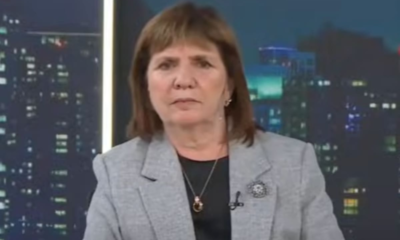INTERNACIONAL
Trump admin makes new move to bring South African refugees to US as president blasts nation’s rulers again
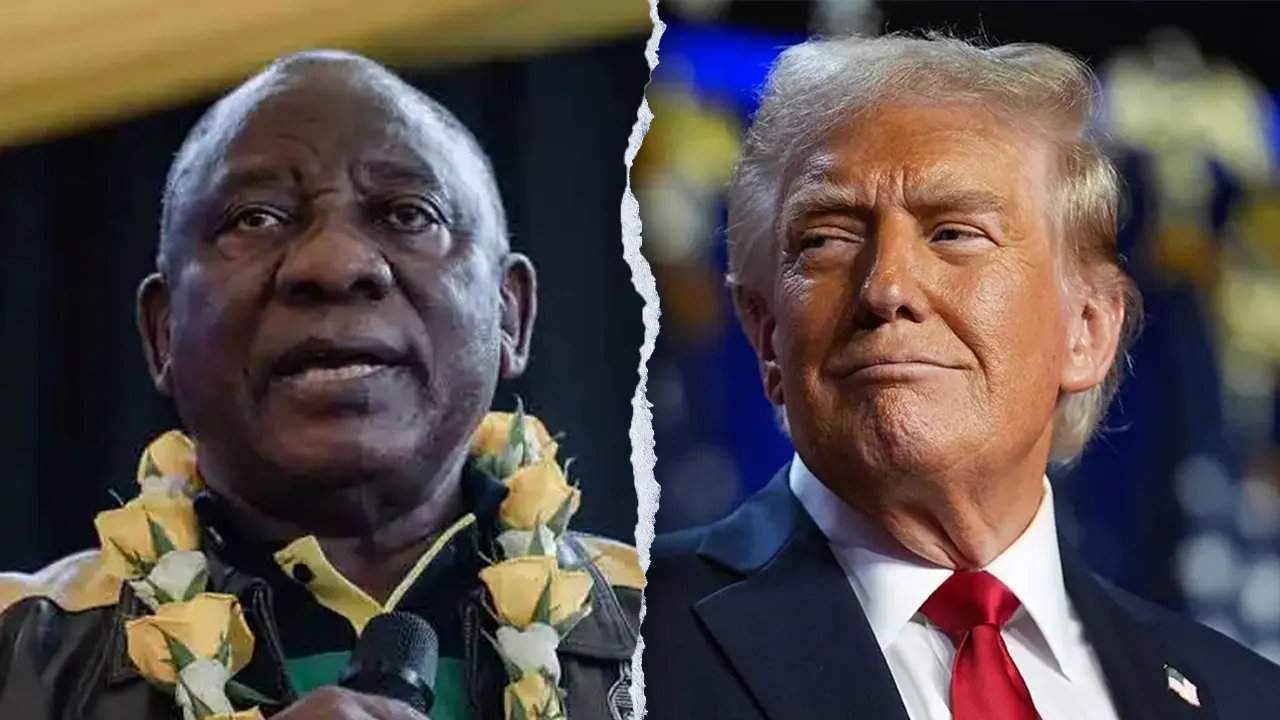
Orania seeks US recognition
With a growing population of 3,000 people Orania is seeking U.S. support to become a fully autonomous area in South Africa. (Video courtesy: Orania Movement.)
FIRST ON FOX: The U.S. and South African groups have started to take action to «improve» the lives of Afrikaners, descendants of white, mostly Dutch settlers, after President Donald Trump said they could settle in the U.S. as refugees.
On Friday, President Trump lashed out again against the South African government for its treatment of farmers, many, but not all of whom, are Afrikaners, positing on his Truth Social media platform via X, «they are taking the land of white Farmers, and then killing them and their families.»
The State Department told Fox News Digital about new moves it is making. At the same time, the Afrikaner Orania Movement, an Afrikaner settlement, has stated its desire to be treated by the U.S. as a state within a state in South Africa.
TRUMP FREEZES AID TO SOUTH AFRICA, PROMOTES RESETTLEMENT OF REFUGEES FACING RACE DISCRIMINATION
This has led to often heated discussions about Afrikaners, and, up until now, no details from the U.S. side. But now there’s real movement, not just talk, taking place.
«The U.S. Embassy in Pretoria (South Africa) is reviewing inquiries from individuals who have expressed interest to the Embassy in refugee resettlement to the United States and has begun reaching out to some individuals to schedule and conduct informational interviews,» the State Department told Fox News Digital.
According to the nongovernmental South African Chamber of Commerce in the U.S., as of last month, 67,042 South Africans have expressed interest in the refugee offer, but the State Department told Fox News digital, «We do not have anything to share on numbers of participants at this stage of the process.»
There’s also been a flurry of flights across the Atlantic to Washington by groups looking to get the White House’s, and ultimately the president’s, attention.
First was the political group AfriForum, widely credited with alerting President Trump to the need for «humanitarian relief» for Afrikaners.
Among other organizations making the trek to D.C. was the Cape Independence Advocacy Group, which says Cape Town and some of the surrounding areas should become a state separate from the rest of South Africa.
But perhaps the Orania Movement’s trip to Washington, and its request for U.S. help, is of most interest.
«Help us Here,» is the slogan Orania CEO Joost Strydom declared to Washington insiders.
SOUTH AFRICAN PRESIDENT SIGNS CONTROVERSIAL LAND SEIZURE BILL, ERODING PRIVATE PROPERTY RIGHTS
Orania has a population of 3,000 people. Its leaders have been lobbying the U.S. in the hope it will get support for its campaign for autonomy. (Riaan Badenhorst/Orania Movement)
Orania is a small but rapidly growing settlement of 3,000 Afrikaners in South Africa’s Karoo region. Strydom told Fox News Digital those settlers don’t want to become refugees in the U.S. but are seeking Washington’s support to become truly autonomous in Africa «not necessarily with U.S. tax dollars, but with recognition with our pursuit of a national home for Afrikaners.
«Orania’s goal is to grow and protect the safety and freedom of Afrikaners. If we can make decisions for ourselves, we can look after our own safety and prosperity. If we are free, we are safe.
«We are a people of Africa, we belong here. We have no other home. On a personal note, my great-grandfather came to Africa in 1676, 100 years before the U.S. declaration of independence.»
Founded in 1988, Orania claims it’s entirely white, Afrikaner population is growing at an average of 10-12% a year, with a growth in business projects of 26%. It has its own water purification and solar power systems. In one of the driest parts of South Africa, Orania’s farmers are successfully developing corn, wheat, pecan nuts, almonds and livestock.
Orania has built its own Afrikaans language schools and a college and has plans to open its own university.
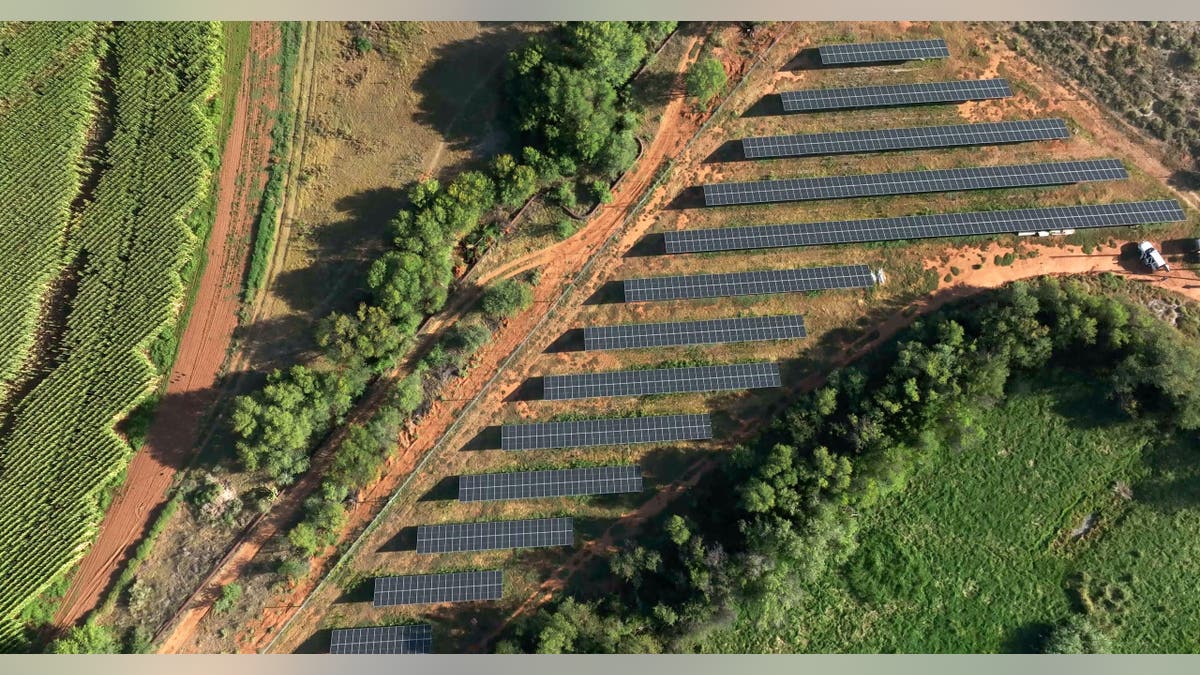
Orania has its own solar power systems. (Riaan Badenhorst/Orania Movement)
The Orania delegation went to Washington, Strydom said, due to «the fact that President Donald Trump gave us recognition as a people, the Afrikaners. (It) made it very important for us to hasten our already-planned U.S. liaison tour to liaise with Afrikaner and American supporters of the Orania idea in the U.S.
TRUMP, SOUTH AFRICA IN GROWING ROW OVER HOTLY CONTESTED LAND LAW, COUNTRY’S DEALS WITH US FOES
«We had meetings with officials upon invitation and discussed substantive matters in depth, which, for the sake of an ongoing conversation and our honor towards newfound contacts, we will only specify publicly later.»
The South African government has attacked those who have gone knocking on Washington’s doors.
«These groups do not represent the majority of South Africans, whether it’s the Orania movement or it’s AfriForum or it’s this Cape Independence Advocacy,» the presidency spokesperson Vincent Magwenya told reporters March 20.
The State Department spokesperson made the administration’s viewpoint clear to Fox News Digital this week.
«Through his executive order, the president has taken steps to hold the government of South Africa accountable for the violation of Afrikaner rights and has instructed the administration to prioritize humanitarian relief for Afrikaners who are victims of unjust racial discrimination,» the spokesperson said.

Orania’s farmers grow corn, wheat, pecans and almonds and also raise livestock. (Riaan Badenhorst/ Orania Movement)
CLICK HERE TO GET THE FOX NEWS APP
Hanli Pieters, who works at Bo-Karoo Opleiding, Orania’s college, is proud of being an Afrikaner and told Fox News Digital she wants to stay in Orania.
«I choose to live in Orania because it offers what so few places can — a safe and purposeful future for Afrikaners. Here, I can live, pray without fear and speak Afrikaans not as a formality, but as the heartbeat of my daily life. We take hands as a community to build, to work and to grow. Orania is where Afrikaner identity becomes legacy.»
Fox News Digital reached out to the South African government for comment but had not received a response at the time of publication.
INTERNACIONAL
Samara Joy, la nueva estrella del jazz mundial, llega a Buenos Aires para compartir “música auténtica, real”

Samara Joy, la gran estrella emergente del jazz mundial, responde con amabilidad (y genuino interés según puede inferirse de su expresión) durante el diálogo con Infobae Cultura por videollamada, en los días previos a su presentación en Buenos Aires. Lo cual es todo un acontecimiento: pocas veces sucede que alguien en pleno auge, se presenta aquí y ahora. Será el martes 29 en el Teatro Coliseo, un buen escenario y una gran oportunidad para poder apreciar su magnífico registro vocal y un fino repertorio que potencia sus virtudes.
En medio del torbellino de su ascenso a la cúpula, esta joven cantante que reivindica y remite a las diosas del género (sí, Ella Fitzgerald y Sarah Vaughan, nada menos), vive estos días con calma y tranquilidad. Cuando se le pregunta si se siente una estrella, o bien, se lo hacen sentir, responde con simpleza: “Creo que sigo sintiéndome como una persona normal y que sigo manteniendo la cabeza fría, centrada en el verdadero propósito de lo que significa la música. Actuar y compartir la música que siento que es auténtica, real, para mí”.
A sus 24 años, Samara Joy se ha consolidado como una de las voces más reconocidas del jazz contemporáneo. Obtuvo tres premios Grammy, incluyendo el de “Mejor Nueva Artista”, distinción que la posicionó con notable visibilidad en la escena musical global. Su popularidad en redes sociales, especialmente en TikTok, facilitó que públicos jóvenes se acercaran al jazz y la música estadounidense tradicional. De todo eso y otras cuestiones, como la familia, su barrio y la comunidad afroamericana en Estados Unidos, habló en esta entrevista que anticipa uno de los shows más esperados del año.
—Te han comparado con Sarah Vaughan o Ella Fitzgerald. ¿Qué podés decir ante semejante comentario?
—Me siento muy afortunada y es porque ellas me han inspirado. Me siento muy honrada de que cuando la gente me escucha, piensen en esas dos grandes vocalistas.
—¿Cómo te cae que hablen de vos como la “gran estrella” emergente del jazz mundial, capaz de atraer a nuevas generaciones?
—Se siente bien. Creo que el jazz sigue siendo una música atractiva. Hay tanta gente creándolo y tanta gente contribuyendo a su sonido y a su presencia hoy en día… Por eso me siento bendecida por formar parte de las muchas voces y músicos que están haciendo música jazz, que la hacen a su manera y la comparten para crear una nueva audiencia.
—¿Crees que los jóvenes afroamericanos, tus congéneres, conocen y se interesan por el jazz?
—Creo que algunos sí y otros piensen que les gusta más lo derivado de él. Quizás les guste la influencia del R&B o el soul más que el jazz clásico. Pero el hecho de que ya haya interés es un comienzo, ¿no?

—Hablando de la música de tu comunidad… ¿Cómo reaccionaste a la noticia de la muerte de Sly Stone?
—Me gusta mucho su música y me entristeció que haya fallecido. Pero hay mucho para escuchar y además nos dejó un mensaje muy positivo a través de su música, por su contribución y una perspectiva única de la vida.
—Cuando recibiste los Grammy, dijiste: “Soy del Bronx”. ¿Qué significa eso? Sabes que el barrio es famoso en todo el mundo y no siempre de manera positiva, pero vos lo conoces muy bien…
—Ser del Bronx, ser de Nueva York… Sabes, hay mucha creatividad por todas partes y mucha música a todas horas. Y creo que ser del Bronx para mí significa estar rodeada de familia, rodeada de música en una ciudad enérgica donde hay tantos tipos diferentes de personas y ámbitos de la vida. Y yo soy una de ellos, ya sabes. Me alegro de hacer oír mi voz en este mar de gente. Así que me siento agradecido de ser del Bronx.

—Por cierto, ¿Qué hay de tus raíces musicales? Me refiero a la música que escuchabas en tu casa. He leído que tu padre y tus tíos eran cantantes.
—Sí. Mi padre es cantante. Tengo antecedentes musicales por parte de mi padre y mis abuelos. Todos están en la lista negra (risas). Todos son munición, todos son artistas de alguna manera. Y el hecho de haber podido estar rodeado de música desde tan temprana edad y haber sido influenciado por la música de su generación, me ayudó mucho a definir mi identidad como artista. Pude absorber diferentes tipos de sonidos, diferentes tipos de música. Y absorberlos en mi propia voz. Por eso creo que pude convertirme en alguien mejor. Fui más consciente de lo que se necesita para hacer música y de cuántos elementos diferentes hay, desde la producción hasta la interpretación, pasando por la mezcla en el estudio y el escenario. Aprendí y asimilé mucho sobre lo que significa ser artista al escuchar la música de las generaciones de mi padre y de mi abuelo. Fueron mis maestros.
—Cuando eras niña o adolescente, ¿Qué tipo de música te gustaba? ¿Música pop o hip hop?
—Escuchaba música pop. Escuchaba mucho R&B… Gente como Destiny’s Child y Musiq Soulchild. También me gustaba mucho un grupo de gospel llamado Commissioned. Pero también escuchaba a clásicos como The Spinners. Muchas cosas diferentes, me educaron bien (risas).

—Saliendo un poco de la música ¿El movimiento Black Lives Matter sigue activo en este momentos tan particular que vive tu país? ¿O es cosa del pasado?
—Mmm… Creo que sigue siendo muy relevante. Especialmente ahora, con lo terrible que es nuestro gobierno en este momento. El movimiento se compone de personas reales, con problemas y preocupaciones reales. Ya sabes, las cosas de la gente común. Así que, en un momento como este, creo que es útil mantener los pies en la tierra con la comunidad y reconocer realmente el papel que tienes que desempeñar para no sentirte impotente y seguir apoyando a las personas que te rodean, por muy terrible que me parezca lo que está pasando. Hay personas sin hogar, personas que están empezando y no tienen nada, así que si puedo hacer que la vida de alguien sea un poco más fácil y contribuir de esa manera… Esa es una forma en la que creo que podemos seguir animándonos unos a otros y mantener y comprender mucho más nuestra humanidad ante problemas como estos: racistas, de género y todos los demás problemas. Hay que mantenerse con los pies en la tierra.
—Eso mismo, los pies en la tierra, aplica para tu momento artístico. Sos muy joven para ya sos muy famosa ¿Cómo se lleva eso?
—Definitivamente. Me siento con los pies en la tierra. Estoy agradecida y siempre quiero mantener esa mentalidad. Porque creo que la creatividad fluye más cuando se es humilde y consciente, pero sin llegar al punto de que eso domine o potencie completamente tu ego. Ya sabes. Así que, sí. Sigo sintiéndome normal.
[Fotos: AD+BN/gentileza Universal Music; Mario Anzuoni/Reuters]
INTERNACIONAL
Tim Walz leading Dem effort to turn bipartisan group against President Trump: report

NEWYou can now listen to Fox News articles!
Progressive governor and failed vice presidential candidate Tim Walz is leading a Democratic effort to turn one of the country’s most influential bipartisan groups against President Donald Trump, according to a report by a mainstream media outlet.
Walz, the governor of Minnesota and one-time running mate of former Vice President Kamala Harris, is threatening to pull out of the bipartisan National Governors Association (NGA) over concerns it is not doing enough to push back against Trump, according to The Atlantic.
The Atlantic reported that two unnamed people «familiar with the governors’ thinking» shared that at least two Democratic governors — Walz and fellow Democratic Gov. Laura Kelly, who is head of the Democratic Governors Association — are opting to stop paying their NGA dues this month.
The two governors will not renew their membership in the organization out of frustration with its inaction against perceived violations of states’ rights by the Trump administration.
TRUMP FOE BOASBERG ORDERS DOJ TO DETAIL STATUS OF CECOT MIGRANTS SENT TO VENEZUELA
Walz, the governor of Minnesota and one-time running mate of former Vice President Kamala Harris, is threatening to pull out of the bipartisan National Governors Association over concerns it is not doing enough to push back against Trump, according to The Atlantic. (Getty Images)
The concerns raised included the Office of Management and Budget briefly pausing disbursements of federal funds in January, the clash with Democratic Gov. Janet Mills over transgender athletes and Trump’s deployment of the California National Guard to respond to the anti-ICE riots in Los Angeles.
The outlet reported three other unnamed sources saying that Walz and Kelly are not alone and that the offices of other Democratic governors are similarly frustrated with the NGA.
One of the unnamed sources said «when you are also paying dues with taxpayer dollars, it has got to be worth it, and they are going to have to demonstrate that. Right now, they are not doing that,» the outlet reported.
The source also claimed «there have been ongoing concerns about the NGA among the Democratic governors and staff, off and on, for years.»
MESSAGING WAR OVER TRUMP’S ‘BIG BEAUTIFUL BILL’ HEATS UP BETWEEN DEMOCRATS, REPUBLICANS
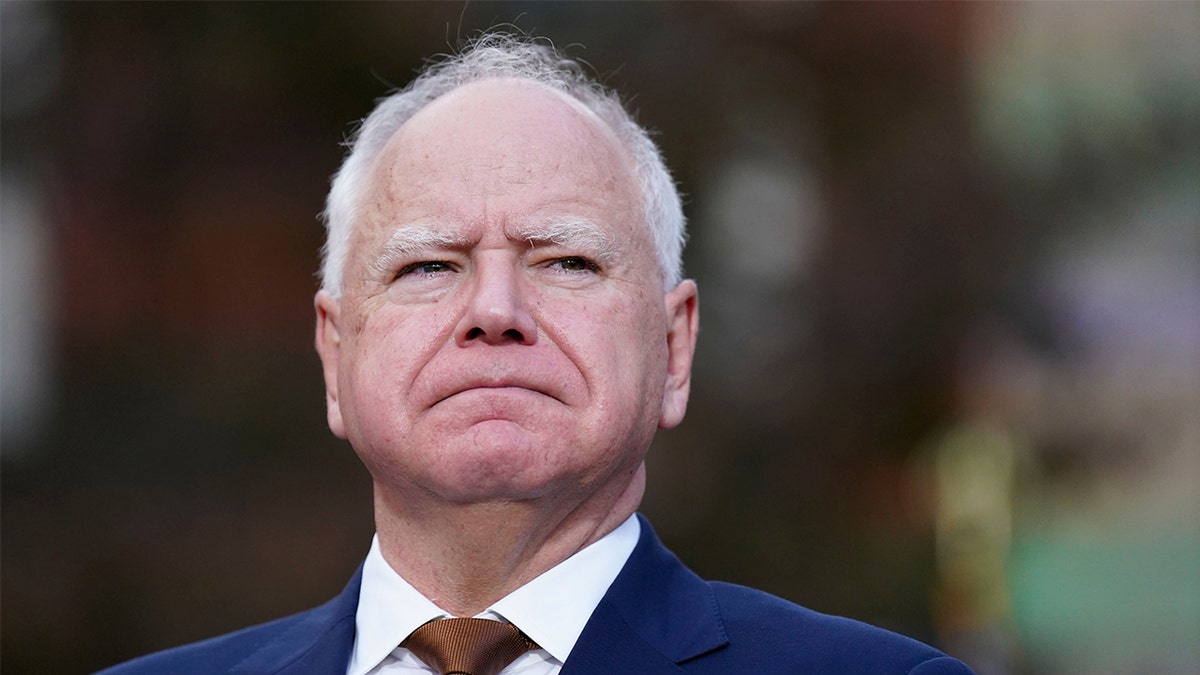
The Atlantic reported that two unnamed people «familiar with the governors’ thinking» shared that at least two Democratic governors — Walz and fellow Gov. Laura Kelly, head of the Democratic Governors Association — are opting to stop paying their NGA dues this month. (Al Drago/Bloomberg via Getty Images)
The NGA has existed as a forum for bipartisan collaboration among governors since 1908. The organization lists all 50 governors as well as leaders of five U.S. territories as members.
Eric Wohlschlegel, NGA communications director, told Fox News Digital the group «exists to bring governors from both parties together around shared priorities.»
Amid the Walz-led controversy, Wohlschlegel said NGA’s «mission hasn’t changed.»
«Every public statement NGA issues reflects bipartisan consensus,» he said. «So far this year, all but one statement has had that consensus, and when governors don’t agree, we simply don’t issue one. That’s how we preserve our role as a bipartisan convener, a principle we won’t compromise.»
DNC CHAIR SAYS ‘WE WANT EVERYONE’ IN DEMOCRATIC PARTY INCLUDING ‘LEFTISTS’ LIKE MAMDANI
A source familiar with the situation blamed the controversy on «Democratic infighting, unspoken campaign jockeying and a few anonymous voices looking to reshape a nonpartisan institution into a political one.»
That source pointed out that, despite all the noise about controversy, the NGA’s summer meeting in Colorado Springs this weekend is expected to have «record turnout» with 13 Republican and seven Democratic leaders attending.
They also noted that «no governors are on the record expressing discontent with the NGA. No allegations of misconduct, governance failure or mismanagement have been raised.»
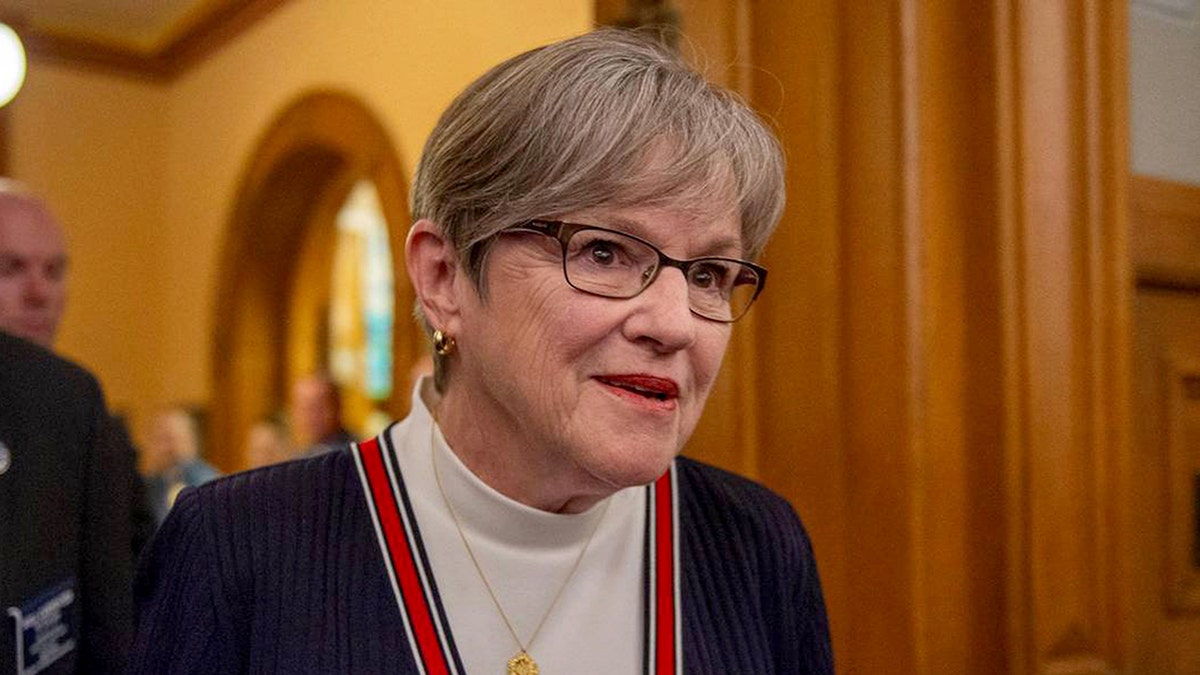
Kansas Gov. Laura Kelly enters the House chamber for the State of the State address at the Kansas State Capitol Jan. 10, 2024, in Topeka, Kan. (Emily Curiel/The Kansas City Star/Tribune News Service via Getty Images)
«What’s behind the noise?» the source added. «There’s an internal power struggle currently and no consensus among Democrats right now on how to lead, how to message or how to govern in a divided environment.
«Several Democratic governors are vying for national attention, testing messages for future campaigns rather than collaborating on consensus governance,» the source added. «The NGA’s bipartisan model is working exactly as it’s supposed to.
DEMOCRATIC PARTY’S AUTOPSY REPORT OF 2024 ELECTION WILL AVOID ASKING IF HARRIS SHOULD HAVE RUN
«When a party can’t agree with itself, it becomes easy to take shots at bipartisan institutions that don’t serve short-term political goals.»
Fox News Digital reached out to the offices of Democratic Colorado Gov. Jared Polis, the outgoing NGA chair, and Republican Gov. Kevin Stitt of Oklahoma, the incoming chair, for comment on the Walz mutiny.
Though not addressing the controversy directly, Conor Cahill, a spokesperson for Polis, told Fox News Digital the governor «has been honored» to lead the NGA and to «work across the aisle with governors on education, permitting reform, standing up to federal efforts to strip away gubernatorial authority around the National Guard and elevating the priorities of states.»
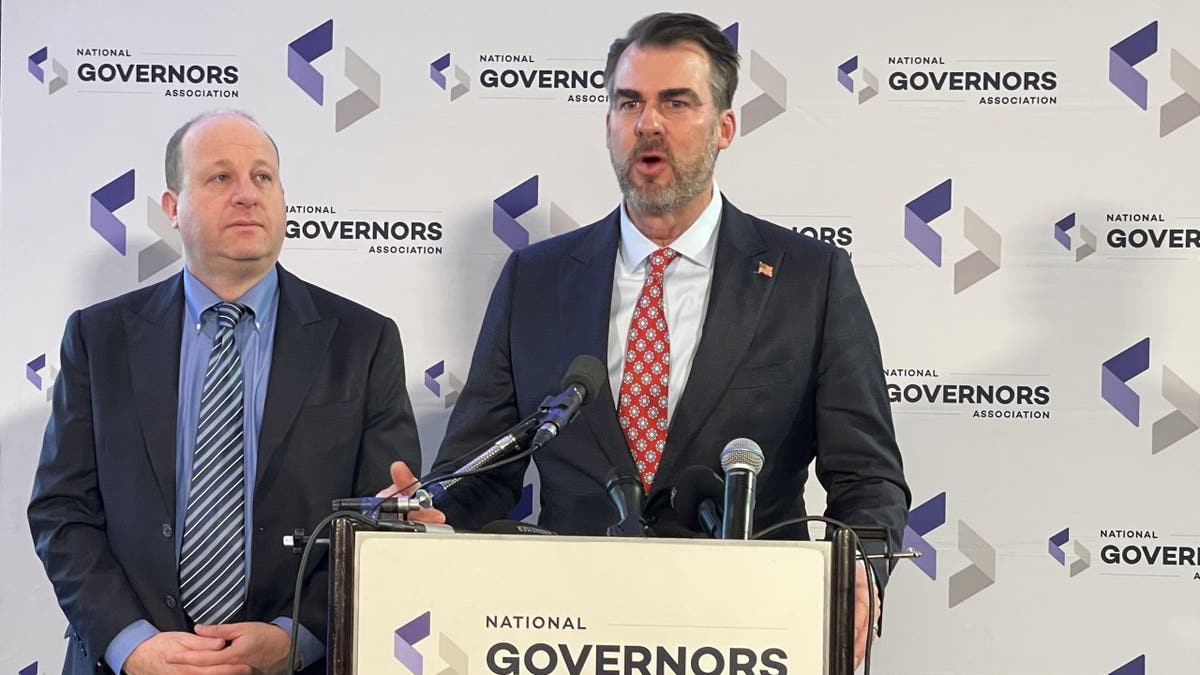
Oklahoma Gov. Kevin Stitt speaks as Gov. Jared Polis of Colorado listens at the NGA in Washington (Fox News/Charlie Creitz)
He added that «during this polarizing time, bipartisan organizations are needed more than ever, and NGA must continue to demonstrate value to all governors and effectively communicate governors’ opinions on various matters with the public and the federal government.»
CLICK HERE TO GET THE FOX NEWS APP
Abegail Cave, a spokesperson for Stitt, who will become NGA chair this weekend, told Fox News Digital «people seem to forget NGA is a bipartisan organization, not a political one.»
«Coming to bipartisan consensus is difficult, but governors from across the political spectrum are addressing the real challenges facing Americans every day,» Cave said.
She said that Stitt «looks forward to leading this organization and finding more areas of collaboration in the coming year.»
Fox News Digital also reached out to the offices of Walz and Kelly but did not receive responses by the time of publication.
INTERNACIONAL
Tensión en el sudeste asiático: Tailandia bombardea Camboya, en una disputa que deja una decena de muertos

El ejército tailandés bombardeó este jueves objetivos militares en Camboya y reportó la muerte de al menos 12 personas en su territorio por disparos del país vecino, en los peores enfrentamientos en 15 años entre estos dos reinos del sudeste asiático.
Los dos países mantienen desde hace décadas una disputa territorial en el Triángulo de Esmeralda, una zona donde confluyen sus fronteras y la de Laos y donde se conservan varios templos antiguos.
En mayo estallaron enfrentamientos armados en los que murió un soldado camboyano. Desde entonces, los dos bandos intercambiaron críticas, provocaciones y represalias, como la restricción de los cruces fronterizos o las importaciones.
Las hostilidades se desataron nuevamente el jueves. Camboya disparó cohetes y proyectiles de artillería sobre Tailandia, que desplegó de su lado seis aviones de combate para bombardear dos objetivos militares en el país vecino.
El Ministerio de Salud tailandés señaló que los ataques camboyanos habían matado a 12 personas, un soldado y 11 civiles. La mayoría de las víctimas murieron cerca de una estación de servicio en la provincia de Sisaket, dos en la provincia de Surin y una en Ubon Ratchathani, todas en el noreste.
Imágenes publicadas en las redes sociales muestran un minimercado consumido por las llamas.
Responsables provinciales informaron que la mayoría de las víctimas son estudiantes, mientras que un niño de ocho años falleció en Surin.
China, que suele mantener buenas relaciones con ambos países, expresó el jueves estar «profundamente preocupada» por estos choques e invitó a las dos partes a «resolver el problema de forma adecuada mediante el diálogo y la consultación», dijo su portavoz diplomático Guo Jiakun.
La Unión Europea hizo un llamado a la desescalada y pidió a ambas partes a que «resuelvan las disputas a través del diálogo y otros medios pacíficos, en línea con el derecho internacional».
En tanto, el primer ministro malasio y actual presidente temporal de la Asociación de Naciones del Sudeste Asiático (ASEAN), Anwar Ibrahim, pidió a ambos países a «moderación» y manifestó su deseo de que se inicien negociaciones.
Bangkok y Phnom Penh reanudaron las hostilidades tras la muerte de un soldado jémer a fines de mayo, en medio de un tiroteo en la zona fronteriza disputada.
Diferentes medidas de represalia, decretadas por ambos bandos pese a los llamados a la calma, ya han afectado a la economía y el destino de numerosos habitantes en las regiones involucradas.
Por su parte, el Ministerio de Relaciones Exteriores de Camboya denunció este jueves la «agresión militar» tailandesa.
Ambas naciones se acusaron mutuamente de abrir fuego primero el jueves por la mañana en las cercanías de dos templos disputados en la frontera entre la provincia tailandesa de Surin y la camboyana de Oddar Meanchey.
El primer ministro interino de Tailandia, Phumtham Wechayachai, afirmó que la situación precisa de «una gestión cuidadosa» y «dentro del derecho internacional». «Haremos lo mejor para proteger nuestra soberanía», dijo.
La embajada de Tailandia urgió a sus nacionales a salir de Camboya «lo antes posible», a menos que tengan razones urgentes para permanecer. China también instó a sus ciudadanos a salir de ese país.
El primer ministro de Camboya, Hun Manet, pidió una reunión de «urgencia» del Consejo de Seguridad de la ONU ante los ataques «no provocados, premeditados y deliberados» de Tailandia.
El enfrentamiento se dio un día después de que Tailandia expulsara al embajador camboyano y llamara de vuelta a su enviado en Phnom Penh, en respuesta al estallido de una mina terrestre que hirió a un soldado tailandés.
El primer ministro tailandés afirmó que una investigación del ejército de su país encontró evidencia de que Camboya había colocado minas terrestres en la zona disputada, algo que Phnom Penh niega.
Camboya rechazó estas acusaciones y aseguró que en las zonas fronterizas están todavía infestadas de minas activas de «guerras del pasado».
El jueves por la mañana, Phnom Phen degradó las relaciones con su vecino «al nivel más bajo», retirando a todos sus diplomáticos en Bangkok excepto uno y expulsando a sus equivalentes tailandeses en su territorio.
Estas son las hostilidades más graves en la frontera de ambos reinos desde unos enfrentamientos alrededor del templo Preah Vihear que dejaron al menos 28 muertos y decenas de miles de desplazados entre 2008 y 2011.
Tailandia,Camboya

 ECONOMIA2 días ago
ECONOMIA2 días agoEl consumo en Argentina crece 4% en junio, ante menor inflación y más crédito

 POLITICA1 día ago
POLITICA1 día agoMáximo Kirchner declaró una fortuna de 8.300 millones de pesos: representa un 76% más que el año anterior

 CHIMENTOS2 días ago
CHIMENTOS2 días agoEl desgarrador testimonio del hermano de Locomotora Oliveras: “El daño es irreversible, solo puede vivir con respirador”















